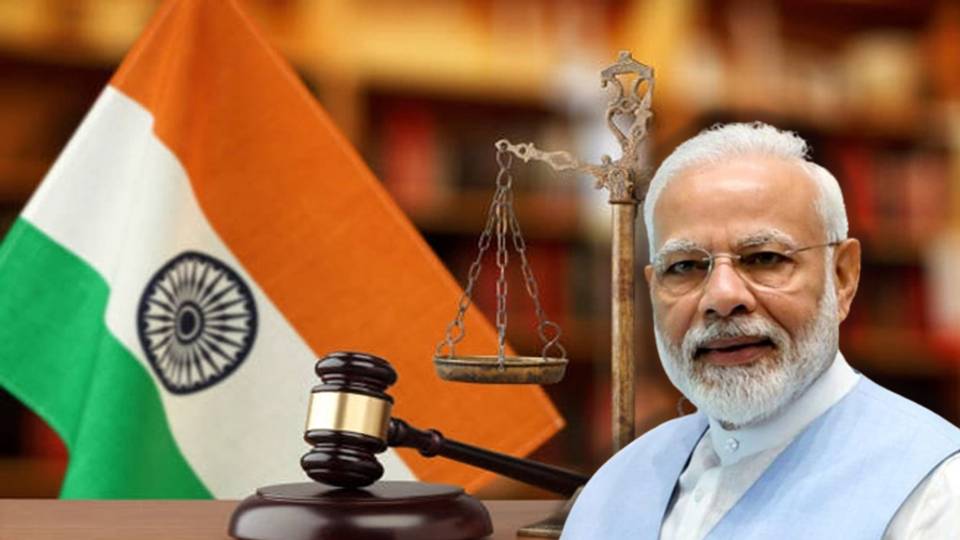Judging people with different yardsticks gives scope for discrimination. It leaves a wide open space for appeasement and vote bank politics. Parties refrain from commenting or amending obsolete and regressive laws of certain religions fearing backlash and erosion in their vote bank. Contrary to that, Sanatan Dharma faces needless interjections from politicians, bureaucrats and judges. Further, rigidities in Abrahamic religions trample the scope of reform and equality for all its believers. That is why there has been unequivocal support from society to bring in Uniform laws in civil matters that can bridge the irregularities among different faiths.
Where does the Indian government stand on UCC?
Bharatiya Janata Party had three core agendas in its manifesto – Ram Mandir, Article 370 and Uniform Civil Code (UCC). With the saffron party fulfilling its two core agendas – Ram Mandir and Article 370, all the political focus has shifted towards the implementation of UCC.
BJP as a party has never distanced itself from the necessity of this reformative law. However, the recent stand of the BJP-led Central government in parliament seems to lack the aggressive intent that the party had on UCC. The government has asked the 21st Law Commission to examine and make fresh recommendations to the UCC. But this action will put the matter on the back burner for some time.
Also Read: UCC in UP, anytime now!
Further, speaking in the parliament, Union Law Minister Kiren Rijiju argued that the country’s stance is the same as that of the BJP. He said, “You know that our government’s thinking is. That’s why we want that our party’s thinking and ideology should be considered the nation’s ideology. We think for the country.”
सामान नागरिक संहिता / Uniform civil code ,भाजपा की विचारधारा है। भाजपा की विचारधारा ही देश की विचारधारा है । यह लागू होगा@KirenRijiju @blsanthosh @BJP4India @RSSorg pic.twitter.com/HCIJk1DS7K
— Dr Nishikant Dubey(Modi Ka Parivar) (@nishikant_dubey) July 27, 2022
Also Read: Namaz, Madrasa and Mandir – BJP and RSS creating new momentum for Hindu Renaissance
In his written reply to the Lok Sabha on 22nd July, Law Minister Rijiju revealed that the government has not taken any decision on the implementation of the UCC as the matter is sub-judice. However, he added that states are free to legislate on personal laws such as intestacy and succession, marriage and divorce.
Unlike this stand of the government, BJP leaders Nishikant Dubey, Giriraj Singh and Kirorilal Meena have been vocal supporters of UCC. They have been bringing in private member bills in the parliament to implement UCC at the pan-India level. Even after having the numbers in its favour in both houses of parliament, the BJP government doesn’t rally behind these private member bills of its party leaders.
Also Read: Will the BJP use Uttarakhand become a testing ground for UCC?
Currently, the BJP along with its allies is in power in 19 states. Although the ruling alliance, NDA, has numbers in the parliament, it seems to have adopted a wait and watch approach. It wants to slowly develop a conducive atmosphere on UCC with debates, public discussions and to and fro of ideas to get the best of the practices before drafting the reformative law.
States taking the lead
Many BJP-ruled states are following a progressive path and have voiced support for adopting Uniform Civil Code (UCC) in their states. Uttarakhand CM Pushkar Singh Dhami has formed a committee to implement UCC in the state. It has also received a draft from the Central government on this issue as well. A draft from the Union government indicates that it has a proper draft on UCC; it is only a matter of time and success in some states that is causing some delay in the pan-India introduction of UCC.
Also Read: “No Muslim Woman wants her Husband to Have 3 Wives” Himanta sets the tone for UCC
Apart from Uttarakhand, Uttar Pradesh, Himachal Pradesh, Assam, Madhya Pradesh and others are also inclined towards the implementation of UCC. These state governments have spoken in favour of forming a committee on the line of Uttarakhand or drafting a law similar to the UCC in practice in Goa.
Courts’ previous observations in favour of UCC
The Supreme Court has made several observations on UCC but the pleas on specific matters and implementation of UCC are still pending before the court. Delhi High Court too has given observations that tilt in favour of UCC. As of now, around 5 pleas seeking implementation of UCC are pending before the Supreme Court and around 6 such pleas are before the Delhi High Court. Several single judge benches have asked the government to take necessary measures to implement UCC in the country.
The Constitution also weighs in favour of the Uniform Civil Code. In Part IV, Directive Principles of State Policies, the framers of the constitution have given the responsibility to successive governments to implement UCC. They have clearly specified this in Article 44 – “The State shall endeavour to secure for the citizens a uniform civil code throughout the territory of India.”
The BJP has delivered on several poll promises it made in its manifesto. This has put the onus on it to deliver on this issue as well. The party has the required numbers as well as public support to implement UCC. This is why the time is right for the Modi government to bring in this reformative law and end the discriminatory laws based on religion.
However, it is important to note that the Modi government seems to have adopted a decentralised approach on UCC. This seems to be a better approach to implementing UCC in states where it is in power. This will avoid the ugly hindrance it had faced on the pan-India introduction of past reforms like Farm laws.
Support TFI:
Support us to strengthen the ‘Right’ ideology of cultural nationalism by purchasing the best quality garments from TFI-STORE.COM
